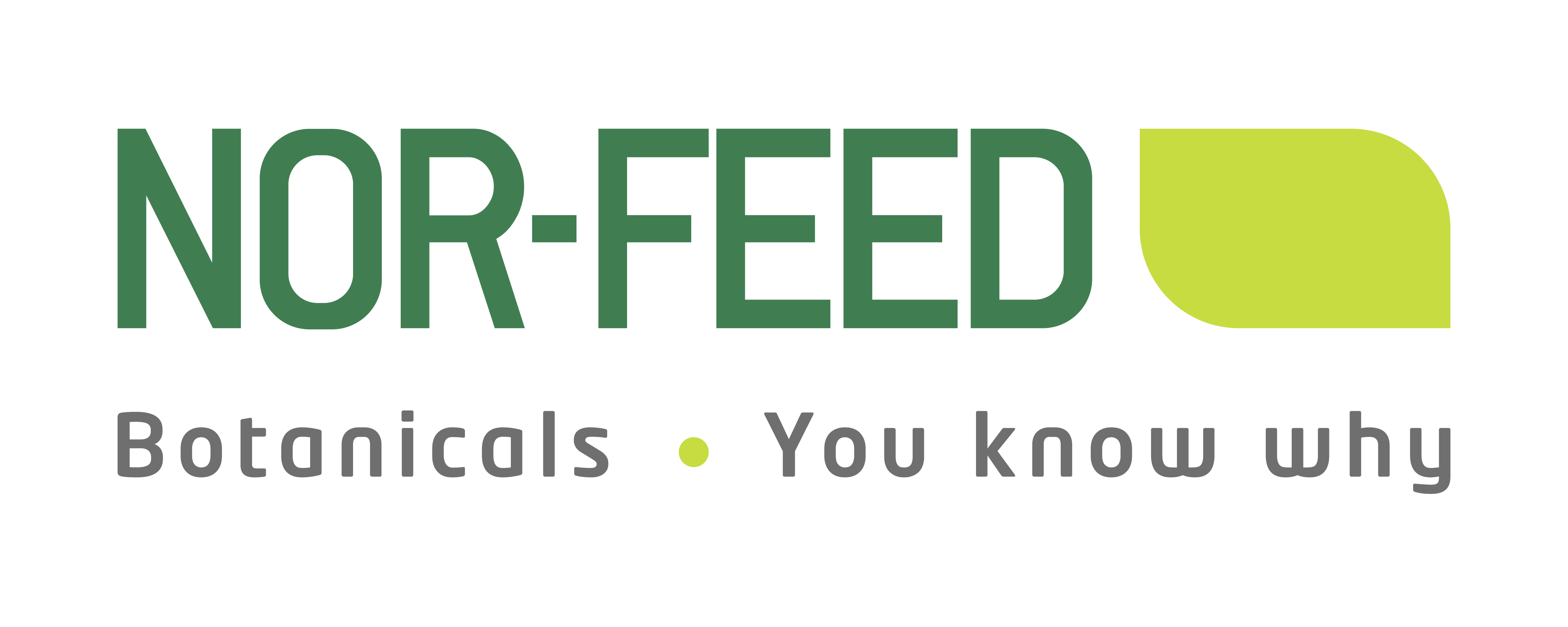



Nor-Feed

Pays de la Loire, France
September 2024
Animal Production
Manufacturing
Algeria,
Australia,
Austria,
Belarus,
Belgium,
Bolivia,
Brazil,
Canada,
Chile,
China,
Colombia,
Cyprus,
Denmark,
Ecuador,
Finland,
France,
Georgia,
Germany,
Greece,
Guatemala,
Hong Kong S.A.R.,
Hungary,
Iceland,
India,
Ireland,
Israel,
Italy,
Japan,
Lithuania,
Mexico,
Moldova,
Morocco,
Netherlands The,
Norway,
Panama,
Peru,
Philippines,
Poland,
Portugal,
Romania,
Russia,
Serbia,
Slovakia,
South Africa,
South Korea,
Spain,
Sweden,
Switzerland,
Taiwan,
Thailand,
Tunisia,
Ukraine,
United Kingdom,
United States,
Vietnam
Nor-Feed develops, and markets natural feed additives and ingredients made of botanicals, for animal health and nutrition. The company focuses its efforts on few plant extracts and plant molecules (grape specific polyphenols, saponins, citrus extracts, and a few others) to offer well characterized, fully standardized additives with solid regulatory status and documented health and nutrition benefits: physiological antioxidants, natural solutions to manage coccidial risk, alternatives to AGPs, stress management and animal well-being solutions, and others. In close collaboration with renowned research institutes and specialized universities, Nor-Feed stays at the forefront of scientific advancements in the field of pharmacognosy. Recently certified B Corp, Nor-Feed has a genuine focus on sustainability and upholds the highest standards in the animal nutrition industry. Nor-Feed is one of the main subsidiaries of Adisseo Group, one of the world's leading experts in feed additives.
Overall B Impact Score
Governance 15.3
Governance evaluates a company's overall mission, engagement around its social/environmental impact, ethics, and transparency. This section also evaluates the ability of a company to protect their mission and formally consider stakeholders in decision making through their corporate structure (e.g. benefit corporation) or corporate governing documents.
What is this? A company with an Impact Business Model is intentionally designed to create a specific positive outcome for one of its stakeholders - such as workers, community, environment, or customers.
Governance 15.3
Governance evaluates a company's overall mission, engagement around its social/environmental impact, ethics, and transparency. This section also evaluates the ability of a company to protect their mission and formally consider stakeholders in decision making through their corporate structure (e.g. benefit corporation) or corporate governing documents.
What is this? A company with an Impact Business Model is intentionally designed to create a specific positive outcome for one of its stakeholders - such as workers, community, environment, or customers.
Workers 31.6
Workers evaluates a company’s contributions to its employees’ financial security, health & safety, wellness, career development, and engagement & satisfaction. In addition, this section recognizes business models designed to benefit workers, such as companies that are at least 40% owned by non-executive employees and those that have workforce development programs to support individuals with barriers to employment.
Community 10.2
Community evaluates a company’s engagement with and impact on the communities in which it operates, hires from, and sources from. Topics include diversity, equity & inclusion, economic impact, civic engagement, charitable giving, and supply chain management. In addition, this section recognizes business models that are designed to address specific community-oriented problems, such as poverty alleviation through fair trade sourcing or distribution via microenterprises, producer cooperative models, locally focused economic development, and formal charitable giving commitments.
Environment 36.3
Environment evaluates a company’s overall environmental management practices as well as its impact on the air, climate, water, land, and biodiversity. This includes the direct impact of a company’s operations and, when applicable its supply chain and distribution channels. This section also recognizes companies with environmentally innovative production processes and those that sell products or services that have a positive environmental impact. Some examples might include products and services that create renewable energy, reduce consumption or waste, conserve land or wildlife, provide less toxic alternatives to the market, or educate people about environmental problems.
What is this? A company with an Impact Business Model is intentionally designed to create a specific positive outcome for one of its stakeholders - such as workers, community, environment, or customers.
Customers 4.5
Customers evaluates a company’s stewardship of its customers through the quality of its products and services, ethical marketing, data privacy and security, and feedback channels. In addition, this section recognizes products or services that are designed to address a particular social problem for or through its customers, such as health or educational products, arts & media products, serving underserved customers/clients, and services that improve the social impact of other businesses or organizations.